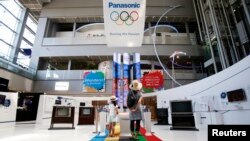Robot porters and wearable translation devices are just some of the innovations Panasonic Corp. would like to launch for the 2020 Tokyo Olympics, an event it hopes will earn it at least $1.5 billion.
As one of the top sponsors of the Games since 1988, Panasonic has mainly supplied TV screens to host venues.
But with the event coming home, Panasonic sees the Olympics-related technology and infrastructure contracts up for grabs as an opportunity to expand its other businesses as it seeks to reduce its reliance on the highly competitive consumer electronics segment.
“The Olympics will without a doubt spur the development of new businesses,” Masahiro Ido, the director of Panasonic's Olympic Enterprise Division, told Reuters in a recent interview.
“Panasonic is not just a home appliance maker, we have all kinds of technologies, including ones related to social infrastructure,” he added.
Panasonic renewed its sponsorship contract with the International Olympics Committee in February, even as most of its divisions were cutting spending amid a company-wide restructuring drive to recover from net losses of 1.5 trillion yen ($14.6 billion) over the two years to March 2013.
The company said it expects to earn at least 150 billion yen, or $1.5 billion, from contracts related to the Games. The total potential revenue, including earnings from new ventures following on from the Olympics, is seven times that amount, it added.
Ideas for Olympics
Some of the ideas Ido's division is proposing include a payment card to be used in trains, shops and restaurants across Tokyo, eliminating the need to carry cash, and systems to prevent traffic jams or control self-driving vehicles.
Panasonic would also like to invest in charging stations at convenience stores for environmentally friendly cars, Ido said. Iwatani Corp. opened Japan's first commercial hydrogen fuel cell charging station last month.
Many of the projects Panasonic is proposing, like its plan to create "cool spots" around town with solar-powered fans and mist-spraying jets, would utilize existing technology, Ido said. The government has made cooling Tokyo a priority during the Olympics, which will be held at the hottest and most humid time of the year.
Panasonic is also hoping its local connections will help it win Olympics business in Tokyo beyond the contracts for TV screens and surveillance cameras it got in the London and Beijing Games.
Ido said Panasonic could leverage ties with Japanese construction firms if it won the contract to supply appliances for the Athlete's Village in Tokyo Bay. The company is also banking on selling existing products like lighting, air-conditioning systems and TVs.
“There are 87,000 hotel rooms within 10 kilometers of the Olympics center, and several thousand just for the International Olympics Committee,” Ido said. “The TVs in their rooms can't be made by Samsung, of course.”





